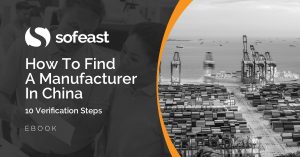Hardly a week goes by without someone asking me for contacts of “good Chinese factories”. We see so many of them, the thinking goes, surely we know a few good ones.
When we did a few trade shows in Hong Kong, 7-8 years ago, it came up roughly every 30 minutes.
Why wouldn’t we do that? For several reasons.
1. Confidentiality
The short answer is “we promise confidentiality to our clients, therefore we can’t share what we have learned when working for one client with another client”.
Some people get this right away and respect us for this. Other people are capable of arguing for hours about this. Their thinking goes this way: we are not hurting our current/past client by sharing this information, but we are hurting the good suppliers out there, and it can also benefit us if we get a few % of the order (as an agent), it is a win-win-win situation, and so on and so forth.
2. Absence of bias
If we say “these guys are good” and then we are to audit their factory and/or inspect their productions, doesn’t something sound wrong here?
As Brad Pritts suggested a few years ago, a good analogy is with a judge in the US. “Each judge should try to avoid all appearance of bias as well as actual bias.”
3. Is there such a thing as a “good factory” in the absolute?
What is a good supplier to one company for a certain period of time is a bad supplier to another company. (And this also requires some explaining.)
I was glad to see that one of the rules of the Asia Importal Facebook group is as follows:
We generally don’t recommend suppliers or provide suppliers lists, as we don’t think that suppliers can be divided into “good” or “bad” suppliers.
I agree! Let’s take an example.
Apple works with a famous contract manufacturer (everyone has heard of them). The products they make for Apple are truly first class — in the millions of pieces, with a very fast ramp up and pretty close to zero defects.
Well, that same manufacturer also produces batches (for other customers) that would not be acceptable for sale in Walmart or Tesco, and sometimes even cheats on components. I know it because we have detected these issues while looking out for the interests of a client.
How is that possible? Well, on the one hand, Apple’s business is something they value. And, perhaps more important, Apple spends a lot of efforts validating their production & testing processes before launching mass production, not to mention all their monitoring all along production.
If, on the other hand, an unknown buyer comes in the picture, gives them a 50,000 USD order, and patiently waits for delivery, they might be disappointed. A second- (or third-) rate team will work on your order, and totally different business rules will apply.
A small buyer, in that situation, is actually better off finding and vetting an unknown manufacturer that accepts to sign a balanced contract. Since there is no particular confidence in that manufacturer, the buyer takes precautions. Trust, but make sure to verify.
—
Have you observed the same phenomenon?
Are you trying to find a manufacturer in China who is well-suited to your needs and can also deliver on their promises?
Sofeast has developed 10 verification steps to help importers find the right manufacturing partner in China. They’re shared in this FREE eBook: “How To Find A Manufacturer In China: 10 Verification Steps.”
It covers:
- Background checks
- Manufacturing capabilities
- Quality system auditing
- Engineering resources
- Pricing, negotiation, & contracts
- …and much, much more
Just hit the button below to get your copy and put yourself in a great position to get better results from Chinese manufacturers who supply your products:



Renaud,
I can verify your comments about the contract manufacturer, having personally witnessed the issues you mentioned, during a visit there for my former company some years ago. As you say the only way to stop something like that happening, is to do your due diligence, validate and monitor all production and testing processes. Expensive, yes, but what is the cost to you if you don’t?
Best Peter
Thanks Peter. It is sad that constant monitoring is still needed that often in China, even with non-mainland-Chinese multi-billion-dollar contract manufacturers…
Dear Renaud,
Please how do one ensure quality adequate monitoring?
Smartphones on my mind.
Colin Chidiogo
Colin – I guess you mean, once you have selected a supplier and given them an order, how to monitor production quality?
For smartphones, what I usually suggestion is:
– Once all critical components (batteries, screens…) are in the assembly factory, and before assembly starts, do a random check.
– Once 5% of the products are completed, go there and do function tests, internal check, etc. etc.
– If no concerns after above inspections, wait until all is completed and nearly fully packed, and do a final random inspection.
That’s what we have done for many clients and it works.
In fact, there is no good factory, only the right factory. There is a proverb in China that Happiness is not happy that only you know. Shoes are fit only the feet know. To find a supplier, you must first establish a supplier standard. Such as supplier area, scale, output value, quality standards, export experience, etc. What I want to emphasize here is the supplier export experience. This is very important. If he has worked with your industry leader, it is easy to judge that the supplier has the corresponding experience.
Yes, these are good points. Thanks Justin.